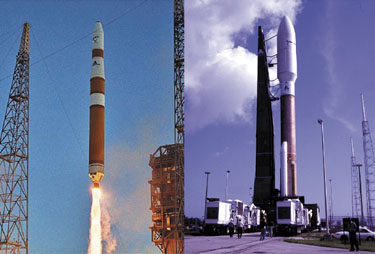12.27.2005
Who Loves ULA?
 As the year closes, the fate of United Launch Alliance, the proposed Boeing Lockheed EELV joint venture announced in May remains, well, up in the air. The companies had hoped for regulatory approval by the end of 2005, but apparently the Department of Defense and FTC are not ready to sign off on the deal.
As the year closes, the fate of United Launch Alliance, the proposed Boeing Lockheed EELV joint venture announced in May remains, well, up in the air. The companies had hoped for regulatory approval by the end of 2005, but apparently the Department of Defense and FTC are not ready to sign off on the deal. (Of course the EU had no problem with it at all.)
Some interested observers, like Citizens Against Government Waste, question the economic wisdom of an alliance that would "combine the production, engineering, test and launch operations associated with US government launches" of Delta and Atlas boosters.
In that vein, in an open letter to Congress this week, (as you may have read on Jeff's blog,) the National Taxpayers Union (NTU) vented its feelings about the joint venture. Urging "a return to price-competitive acquisitions," the NTU challenged the companies' projected annual savings to the Air Force of $100-150 million (which by the way is one quarter of the amount last week's NYC transit strike reportedly cost the city per day) as "dubious on its face," and said any savings that "might result from the merger will be more than offset by increases in taxpayer-funded subsidies to Boeing and Lockheed ... ultimately costing taxpayers upwards of $500 million per year due to the Air Force's EELV acquisition strategy."
One calculus seems clearer: Boeing stands to save mucho megabucks if its former rival drops its federal suit for trade secret theft. (I haven't seen the JV agreement but as Boeing's May 4, 2005 8K (-- that's a required SEC filing for you non-corporate lawyer types) -- specifies, the "Master Agreement provides that Boeing and Lockheed Martin will promptly request an order from the U.S. District Court suspending all activity in the pending civil litigation between them related to a previous competition for launches under the Air Force Evolved ELV program. As of the closing of the transactions contemplated by the Master Agreement, the parties will enter into a final settlement agreement and will dismiss all pending claims in the civil proceeding." Well that's one way to resolve a lawsuit.
Space policy experts offer mixed views of ULA. In his commentary in BusinessWeek, Stan Crock collected some opinions:
John Logsdon, director of George Washington University's Space Policy Institute said, "The country shouldn't have to pay the price of maintaining two totally separate production lines and engineering forces."
Loren Thompson, COO of the Lexington Institute said if "demand for launches continues to be slack, 'there isn't much alternative' to the merger."
And John Pike, director of Globalsecurity.org, told Stan, "With the merger, 'we get the 'benefits' of high costs from two production lines and the 'benefits' of high costs from having a monopoly supplier,' and 'If you want to imagine the least efficient way possible of doing it, this is it.'
Meanwhile, as Boeing and Lockheed try their hand at bonding, many hearts have been stolen by the start-up that may change everything.
And we know how SpaceX feels about ULA.
(image credit: AFA.org)






